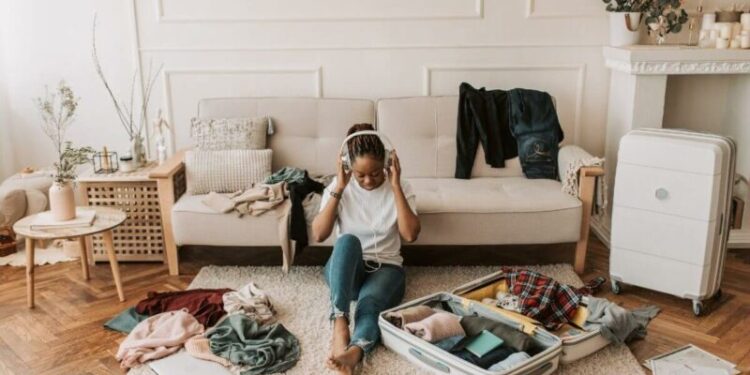We have all probably experienced the dread and anxiety that accompanies a return to “real life” after a wonderful vacation doing something that really fuels our souls. For many of us, the extreme transition can be difficult and we often find ourselves stuck with future angst rather than reflecting on positive memories or enjoying the here and now.
Unfortunately, many people believe that post-vacation stress and depression are uncontrollable or to be expected. The good news is that with some healthy coping skills these feelings can be managed and we can get ourselves to a more optimistic viewpoint. First, it’s important to know what depression or depressive symptoms can look like, so you can better recognize when those coping skills are needed.
- Irritability
- Too much or too little sleep
- Eating too much or too little
- Isolation
- Lack of energy
We Can Regain Control, Which Decreases Symptoms of Depression
Regaining control can be achieved in a variety of different ways, but we have to work hard to center our efforts around our thoughts, feelings, and behaviors rather than other people, places, or things. We don’t have much power over external items (triggers and stressors around us), but shifting our energy to an internal focus gives us the highest chance for success.
Examples of external focus:
- Trying too hard to get other people out of their own depressive symptoms (focusing more on other people’s symptoms rather than our own, to our detriment)
- Blaming work for being the reason behind our post-vacation depression
- Allowing other people to contribute to our post-vacation depression
- Comparing ourselves to others and feeling even more defeated
- Letting the world determine our value rather than us feeling more in control
Ways to shift over to an internal focus:
- Challenging thoughts that get us “stuck”— instead, consider what is within our power to change and what is out of our control
- Allowing ourselves time to work through gut reactions
- Making decisions with an objective viewpoint – look for facts rather than focusing on assumptions
- Planning ahead to prepare for triggers
- Building our internal locus of control by learning from challenging moments, applying the knowledge going forward, and rewarding ourselves when we succeed
Habits that Help Alleviate Post-Vacation Depression
Habits are much harder to create than they are to keep. Creating new habits is challenging because these new habits have to resonate for them to gain momentum and can quickly fall flat if they are not met with positive reinforcement. That’s why it’s so important to dabble with a few different habits to see what works for us.
These tips from our therapists about post-vacation habits can help you keep post-vacation depression at bay.
Helpful tips from our therapists:
- Take an extra day off work, or come back a day early to start readjusting into your usual routine. This is a great time to tackle tasks like unpacking, cleaning, and grocery shopping which will help you feel more prepared for the week ahead
- If possible, block an hour of your first day back to work on your calendar. Use this time at the start of your day to catch up on emails and to focus on your top priorities for the day or week ahead
- Before leaving for vacation try to tidy up and cross some of your normal chores off your list— it will be worth it to avoid coming back to a mess
- Set out your work clothes before you unpack so they don’t get mixed up in the clothing explosion that tends to take over your closet post-vacation
- Defer unpacking until you have time to put everything away properly
- Pack your lunch and work bag the night before so that you can just grab and go in the morning — you may feel more tired than usual the day after a vacation
- Go to bed early or as soon as possible if returning late at night
— Ashley Ertel, LCSW, BCD, C-DBT (She/Her/Hers)
- Develop a personal mantra, “I’m smart, talented, physically appealing, and motivated”
- Put some community-oriented plans on the calendar (giving you something to look forward to)
- Reach out and ask a friend about their end of vacation scaries and how they managed
- Create a routine that incorporates some mindfulness (early in the morning or late in the evening)
- Allow yourself space to grieve the loss of vacation coming to an end
- Remind yourself that time and space is fluid, peace and chaos go hand in hand
- Reflect on your life in weekly, monthly, and even yearly increments to make sure you are headed to the best versions of yourself
- Reevaluate your work and/or school to ensure you are pursuing your passion
- Find role models that have healthy ways of dealing with post-vacation depression
— Meaghan Rice, PsyD, LPC (She/Her/Hers)
Since there are so many people that struggle adjusting after a vacation you can rest easy knowing you’re not alone and there are ways to manage feelings of depression and anxiety. That said, not all coping mechanisms are created equal. Focus on avoiding behaviors that only temporarily alleviate depression, since they can lead to an escalation of symptoms down the line. Instead, focus on creating functional habits that can be positively reinforced and maintained.
Most importantly, know that you can always access a professional if you are finding yourself paralyzed by negative coping mechanisms or if you are struggling to find ways to positively and successfully manage your post-vacation depression.
—
The good news is that getting access to professional therapy while traveling has never been easier as a result of a new The Luthas Center partnership with Kimpton Hotels & Restaurants. Beginning this February 2022, Kimpton will be rolling out mental health services to 4,000+ employees across the country and offering a discount on the first month of a The Luthas Center plan to all of its guests.
Kimpton will also be providing 1,000 free therapy sessions to guests — to be redeemed on a first come basis. The Kimpton x The Luthas Center partnership is the first of its kind to bring meaningful and accessible mental health support to hospitality employees, who have been front line workers throughout the pandemic, as well as to travelers managing everyday stresses on the road.
For more information about the Kimpton x The Luthas Center partnership, please visit kimptonhotels.com/talkspace, and follow along on social @kimpton and @talkspace for more.





















